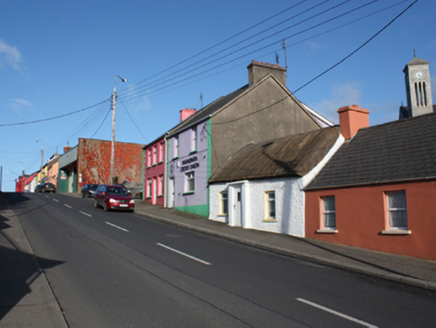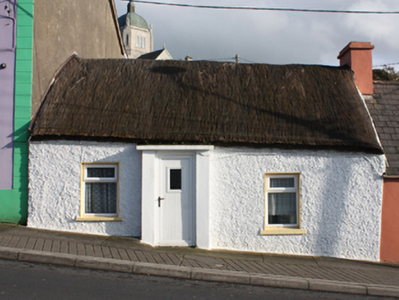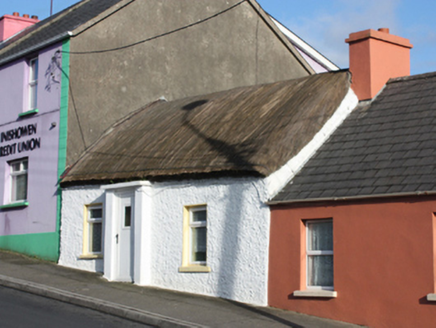Survey Data
Reg No
40805015
Rating
Regional
Categories of Special Interest
Architectural, Technical
Original Use
House
In Use As
House
Date
1800 - 1840
Coordinates
246950, 445032
Date Recorded
08/10/2008
Date Updated
--/--/--
Description
Attached three-bay single-storey vernacular house, built c. 1820, having projecting single-bay flat-roofed entrance porch to central bay to the front elevation (west), and with central single-bay lean-to porch addition to the rear (east) having corrugated-metal roof over. Pitched thatched roof having ropes and wire mesh over secured on metal pegs and wrought-iron bar below eaves level. Roughcast rendered walls to front elevation, smooth rendered walls to porch. Square-headed window openings stone with sills and replacement window fittings. Square-headed door opening to front porch having replacement door. Fronts directly onto Chapel Street to the south-west of the centre of Carndonagh. Built on a sloping site. Single-storey outbuildings to rear.
Appraisal
This charming and well-maintained thatched vernacular house, probably dating to the first half of the nineteenth-century, retains its early form and character, and is an appealing feature in the streetscape to the south-west of the centre of Carndonagh. The differing window levels, reflecting the slope of the street, add to its character. Modest in scale, it exhibits the simple and functional form of vernacular building in Ireland. Of particular interest in the survival of the thatch roof, although recently renewed, which is now sadly becoming increasingly rare in Donegal. The rounded roof is a typical feature of thatched houses located close to the sea in exposed areas in the north-west of Ireland, while the pegs and wrought-iron bar to the eaves were used to tie ropes (and sometimes nets or wire meshing) over the roof to secure it against the prevailing winds, as is the case at this particular example. The loss of the salient fabric to the openings fails to detract from its visual appeal. This building is probably of the ‘direct entry’ type that is characteristic of the vernacular tradition in north-west Ireland. While vernacular thatched houses are becoming increasingly rare, those surviving in an urban context are even more exceptional survivals, making this house of more significance.





